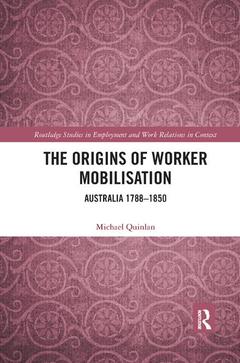The Origins of Worker Mobilisation Australia 1788-1850 Routledge Studies in Employment and Work Relations in Context Series
Auteur : Quinlan Michael

This is a book on how and why workers come together. Almost coincident with its inception, worker organisation is a central and enduring element of capitalism. In the 19th and 20th centuries? mobilisation by workers played a substantial role in reshaping critical elements of these societies in Europe, North America, Australasia and elsewhere including the introduction of minimum labour standards (living wage rates, maximum hours etc), workplace safety and compensation laws and the rise of welfare state more generally.
Notwithstanding setbacks in recent decades, worker organisation represents a pivotal countervailing force to moderate the excesses of capitalism and is likely to become even more influential as the social consequences of rising global inequality become more manifest. Indeed, instability and periodic shifts in the respective influence of capital and labour are endemic to capitalism.
As formal institutions have declined in some countries or unions outlawed and severely repressed in others, there has been growing recognition of informal strike activity by workers and wider alliances between unions and community organisations in others. While such developments are seen as new they aren?t. Indeed, understanding of worker organisation is often ahistorical and even those understandings informed by historical research are, this book will argue, in need of revision.
This book provides a new perspective on and new insights into how and why workers organise, and what shapes this organisation. The Origins of Worker Mobilisation will be key reading for scholars, academics and policy makers the fields of industrial relations, HRM, labour economics, labour history and related disciplines.
1. Reconsidering the Collective Impulse and the Colonial Context
2. Law, the Courts and Inequality at Work
3. Overview of Worker Organisation, 1788-1850
4. Analysing the Components of Organisation
5. Organisation in Transport and Maritime Activities
6. Organisation in the Rural and Extractives Sectors
7. Organisation in Construction and Building Materials
8. Organisation in Manufacturing and Related Trades
9. Organisation in Government and Community Services
10. Organisation in Commercial, Personal Services and Retailing
11. Peak and Political Organisation
12. Re-evaluating Worker Mobilisation
Michael Quinlan is professor of industrial relations in the School of Management at the University of New South Wales, Australia. He is also an adjunct professor in the School of History and Classics at the University of Tasmania and a visiting professor at the Business School, Middlesex University in London. Born in Sydney he divides his time between this city and Launceston, Tasmania where much of this book was written.
Date de parution : 12-2019
15.2x22.9 cm
Date de parution : 11-2017
15.2x22.9 cm
Thèmes de The Origins of Worker Mobilisation :
Mots-clés :
Mutual Insurance; Goat Island; Worker Migraton; NSW Legislative Council; Worker Mobilisation; Van Diemen’s Land Company; industrial relations; Campbell Town; labour economics; Informal Collective Action; labour history; Convict Workers; NSW Government; Sydney Gazette; Van Diemen’s Land; Australian Agricultural Company; Free Workers; Sydney Herald; UK Model; Convict Gangs; Unilateral Regulation; Tasman Peninsular; Recherche Bay; Collective Dissent; Successive UK Government; AA Company; Reduce Wealth Inequalities; UK Port; UK Government Minister; Trades Halls



